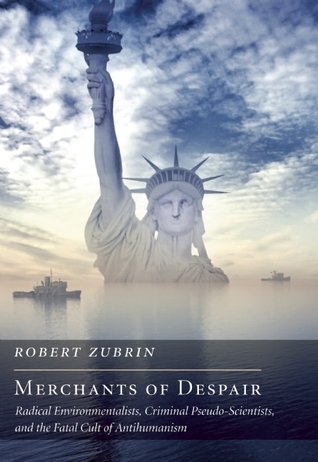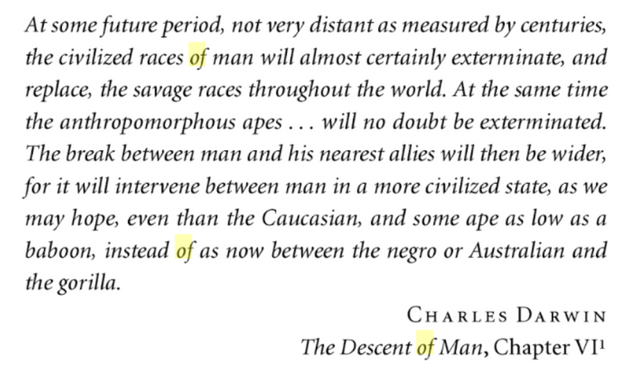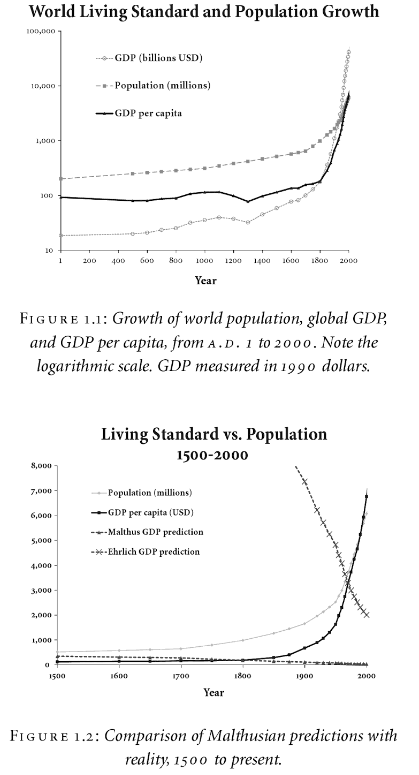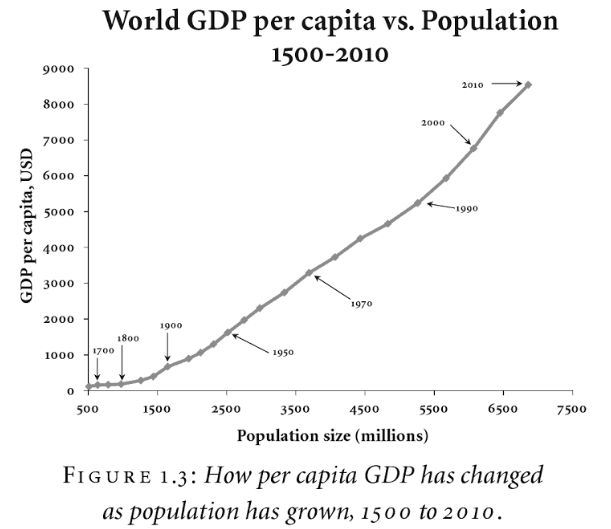Merchants of Despair In Troubled Times
Author is sick of stupid ideas that kill people.

Merchants of Despair: Radical Environmentalists, Criminal Pseudo-Scientists, and the Fatal Cult of Antihumanism, is a recent book by Robert Zubrin. Here’s the author’s bio:
Robert Zubrin is the author of numerous books, including Energy Victory and The Case for Mars, a bestseller on space exploration and the human future. He is the president of Pioneer Astronautics, a fellow of the Center for Security Policy, the founder of the Mars Society, and a contributing editor to The New Atlantis. He has a Ph.D. in nuclear engineering and nine U.S. patents granted or pending. He lives in Golden, Colorado.
The dust-jacket description of the book:
There was a time when humanity looked in the mirror and saw something precious, worth protecting and fighting for—indeed, worth liberating. But now, we are beset on all sides by propaganda promoting a radically different viewpoint. According to this idea, human beings are a cancer upon the Earth, a horde of vermin whose aspirations and appetites are endangering the natural order. This is the core of antihumanism.
Merchants of Despair traces the pedigree of this ideology and exposes its pernicious consequences in startling and horrifying detail. The book names the chief prophets and promoters of antihumanism over the last two centuries, from Thomas Malthus through Paul Ehrlich and Al Gore. It exposes the worst crimes perpetrated by the antihumanist movement, including eugenics campaigns in the United States and genocidal anti-development and population-control programs around the world.
Combining riveting tales from history with powerful policy arguments, Merchants of Despair provides scientific refutations to all of antihumanism’s major pseudo-scientific claims, including its modern tirades against nuclear power, pesticides, population growth, biotech foods, resource depletion, and industrial development.
Antihumanist. Think about that – because what Zubrin does is take on almost every holy cow of the Green movement and leaves them butchered. The book is a fascinating, yet grotesquely depressing, recounting of the immense body count piled up by the antihumanist movement in the last two centuries (and counting).
All of the atrocities compiled in the book were committed by governments, typically Western governments, and usually (but certainly not exclusively) on 3rd World peoples. I don’t know if this is why they hate us, but it sure could be a cause.
Not Just "Hordes of Vermin"

Zubrin doesn’t really focus on the common theme for me of his book, and IMHO it is not simply the “hordes of vermin” thing (although that was Malthus’ argument). The over-riding theme to me is that a relatively small group incessantly promote a pet theory until government adopts their position – and that’s when the dying starts.
In almost every case, an intellectual writes a book presenting a narrative condemning some segment of society for a soon-to-come catastrophe that will kill us all. The intellectual’s narrative garners popular support, some politicians are impressed by the arguments and the popular support, and public policy is implemented to enact the intellectual’s narrative. Typically, the narrative matches the prejudices of government, and hence is used as a stalking horse for the governments’ true goals.
Malthus got the ball rolling by claiming that a growing population of poor people had to be reduced or humanity would exceed the Earth’s carrying capacity and wealth per capita would drop. This was also the theme of Paul Ehrlich in his book “Population Bomb”. In support of the theories of Malthus and Darwin, the British government used starvation as a technique, killing millions of Indians and Irish, among others.
Zubrin starts his book by showing that this narrative is patently false. He shows in a set of figures (Fig.’s 1.1, 1.2 and 1.3, pages 17 through 20) that GDP per capita increases with population! If we all want to be richer, we need more people, not less.


Do Too Many Humans Take Too Much and Despoil The Planet?
Non-renewable resources (oil, gas, coal, minerals) really aren’t limited for purposes of society, and have been becoming less scarce over time (compare to fish). A famous example was Julian Simon’s offer, in 1980, to wager $10,000 that a basket of commodities would be cheaper 10 years hence than in 1980. Paul Ehrlich (“The Population Bomb”; “India should be allowed to die”) and John Holdren (an accolade of Ehrlich, co-author of one of Ehrlich’s books, and Chief Science Adviser to Obama) leapt at the bet. I mean, the Club of Rome had predicted that many of these commodities would be exhausted (for example tin) by 1987. Quote Ehrlich: “The lure of easy money can be irresistible”.
Of course, Simon won going away and Ehrlich and Holdren (both MacArthur Genius Award recipients) lost. When the bet was settled in 1990 tin ore reserves (bauxite) had increased 1,657% from 1950.
The antihumanist impulse can be seen repeatedly through history. A policy of starvation became eugenics (at least two of Darwin’s close relatives – including his son – were major figures in the eugenics movement), until Hitler came along and discredited it. Next came ‘population control’ -- millions were harmed and some killed through policies of sterilization, abortions and, especially in China, infanticide. The AIDs epidemic in Africa was primarily the result of contaminated needles in birth-control clinics (wow!). A U.S. native tribe was made extinct by the sterilization of every single female of the tribe. Today, Planned Parenthood abortion clinics are concentrated in black communities (Margaret Sanger, the founder of Planned Parenthood, was big in the eugenicist movement).
Since at least Rachel Carlson’s “Silent Spring”, the new wave political left has taken the helm in opposing life-affirming technology. Carlson’s book resulted in the banning of DDT because it allegedly weakened eggs shells in some species of birds. In truth, it has at most modest side effects and it’s use saved 100s of millions of people. Another example is the anti-GMO movement. They don’t want modern technology messing with Mother Nature – so people continue to starve and children go blind because of lack of high yield crops or vitamin deficiencies.
The anti-nuke movement is very far from Zubrin’s heart (he’s a nuclear physicist). The U.S. and most of the world has been denied cheap, abundant, clean nuclear power because of the antihumanists.
Then there is the Global Warming narrative. In the 70’s the usual suspects insisted that global cooling was going to kill us all, and fixed the blame on the gluttonous consumption of resources by the Western World and too many poor people elsewhere (I’m pretty sure they extended blame for the cooling to carbon emissions). They demanded government do something. When the earth got a little warmer starting in the ‘80’s, the same usual suspects said global warming was going to kill us all, and again fixed the blame on humanity.
Pascal's Warning
In the past, the antihumanist movement was mostly arguments about how the poor and genetically inferior people were sucking up too many resources, or that achieving human perfection required eliminating the flawed people. In it’s current evolution the argument is that capitalism and Frankenstein technology, combined with the excess consumerism of 1st World Nations, is destroying the Earth and will kill us all in short order:
My point is not to minimize our dangers. Rather, it is to understand why apocalyptic fear has gripped so many of our leaders, scientists and intellectuals, who insist on reasoning and arguing as though they were following the scripts of mediocre Hollywood disaster movies.
Over the last half-century, leftist intellectuals have identified two great scapegoats for the world's woes. First, Marxism designated capitalism as responsible for human misery. Second, "Third World" ideology, disappointed by the bourgeois indulgences of the working class, targeted the West, supposedly the inventor of slavery, colonialism and imperialism.
The guilty party that environmentalism now accuses—mankind itself, in its will to dominate the planet—is essentially a composite of the previous two, a capitalism invented by a West that oppresses peoples and destroys the Earth.
Environmentalism sees itself as the fulfillment of all earlier critiques. "There are only two solutions," Bolivian president Evo Morales declared in 2009. "Either capitalism dies, or Mother Earth dies."
. . .
We begin to suspect that the numberless Cassandras who prophesy all around us do not intend to warn us so much as to condemn us.
The Ideology of Catastrophe: These are not great souls who alert us to troubles but tiny minds who wish us suffering if we refuse to listen to them by Pascal Bruckner In The Wall Street Journal
Bruckner identifies the ethos of the antihumanist that has been with us since Malthus but has been refined, for related ideological reasons, to be an indictment of modern society.
As an aside, Transhumanisn is, in many ways, profoundly antihumanist. It is common to see statements like “if all of humanity dies to produce super intelligence it will be worth it” on Transhumanist sites. In addition, the “ resource society” or “sustainability” memes reject the concept of man’s dominion over nature, requiring humans to limit their consumption, and numbers, to meet some arbitrary standard of living in harmony with nature.
Zubrin’s Merchants of Despair is not just a good read, but may be historic in the battle between humanity and the antihumanists. Highly recommended.
P.S. This video is a pretty good overview of the book by Zubrin. It’s long, but his presentation is half the video (the rest is questions)
This is a good review of Merchants at the American Thinker .
This post has been ranked within the top 80 most undervalued posts in the second half of Jan 27. We estimate that this post is undervalued by $5.18 as compared to a scenario in which every voter had an equal say.
See the full rankings and details in The Daily Tribune: Jan 27 - Part II. You can also read about some of our methodology, data analysis and technical details in our initial post.
If you are the author and would prefer not to receive these comments, simply reply "Stop" to this comment.
"Go"!